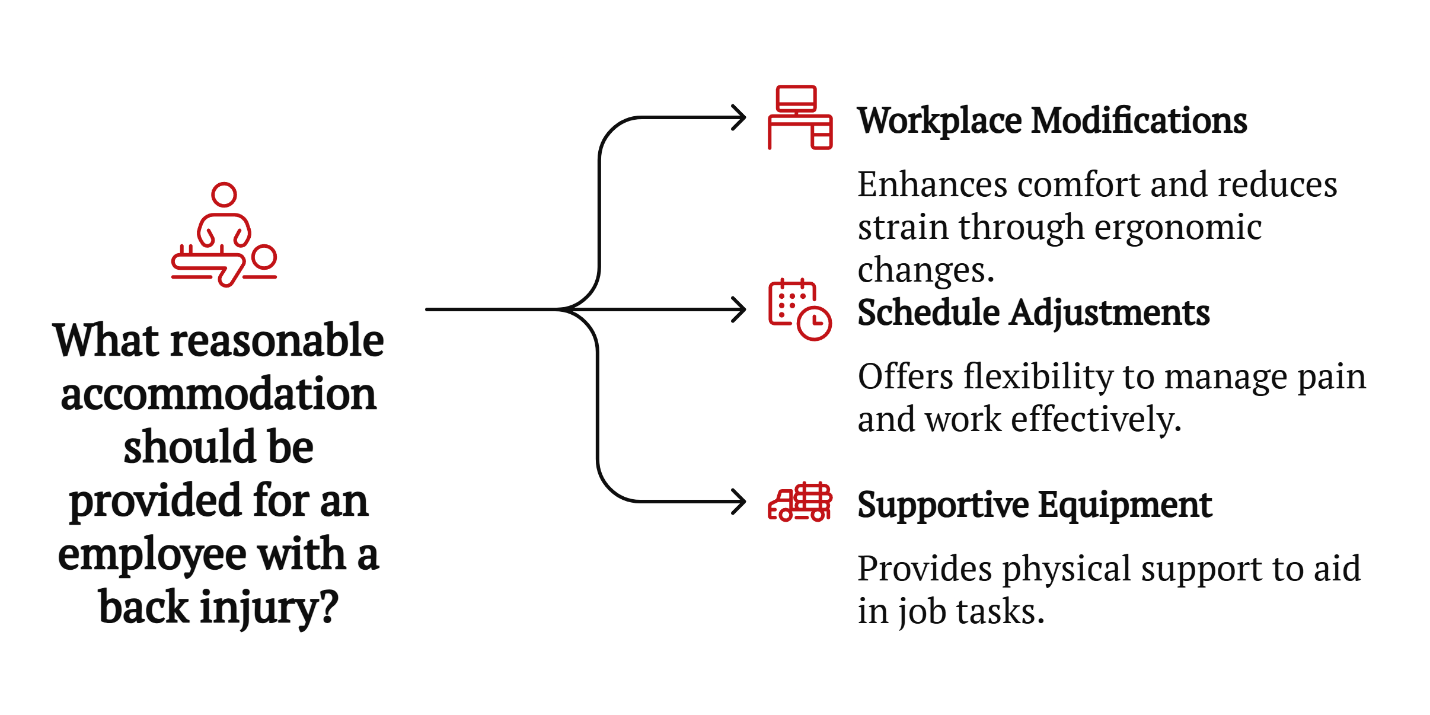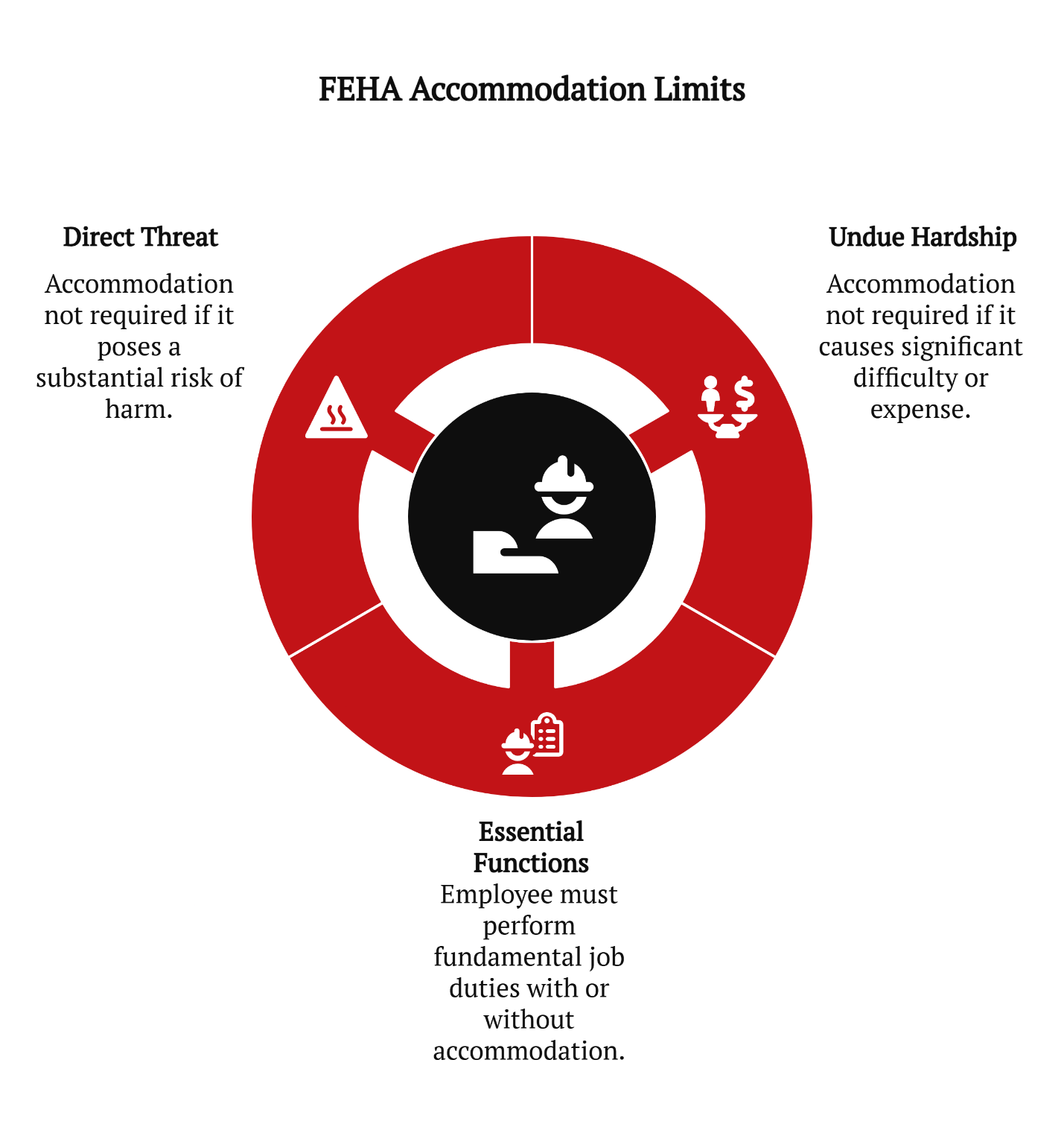📌 Key Takeaways
When your back injury limits your work, knowing California’s accommodation rules can be the key to protecting your livelihood.
FEHA Provides Stronger Protections: California’s Fair Employment and Housing Act offers broader disability accommodation rights than federal law, especially for employees with back injuries.
The Interactive Process is Mandatory: Employers must engage in a good-faith, two-way discussion to identify effective accommodations that allow you to perform essential job functions.
Accommodations Can Be Varied: Options may include, but are not limited to, ergonomic equipment, modified schedules, or workplace adjustments tailored to your functional limitations.
Employer Duties Have Limits: Requests may be declined if they impose undue hardship, remove essential job functions, or create a direct safety threat that cannot be mitigated.
Information Exchange is Critical: Clear communication and appropriate documentation are essential to ensuring employers understand and respond to accommodation needs.
Understanding these principles empowers you to navigate workplace challenges with confidence while keeping your career on track.
California Statutory Framework Overview
Under California law, the Fair Employment and Housing Act (FEHA) generally requires employers to provide reasonable accommodations to qualified employees with disabilities, which may include back injuries. FEHA’s protections are often broader than those found in the federal Americans with Disabilities Act (ADA), meaning that an employee in California may have additional rights not available under federal law. A physical condition that limits major life activities—such as lifting, bending, or standing for extended periods—can meet the statutory definition of a disability.
These legal frameworks aim to protect employees across various industries, including physically demanding fields such as construction, healthcare, warehouse work, and manufacturing.
Employer Obligation Concepts
California law requires employers to engage in an interactive process with employees who request accommodations due to a disability. This process is intended to be a collaborative, good-faith dialogue focused on identifying and implementing effective workplace adjustments.
Potential accommodations may include changes to the work environment, adjustments to job duties, or modifications to work schedules. The goal is to enable the employee to perform the essential functions of the position while ensuring that the employer’s operations can continue effectively.
Back Injury Accommodation Categories

For employees with back injuries, reasonable accommodations may include, but are not limited to:
- Workplace modifications such as ergonomic chairs, adjustable desks, or reconfigured workstations.
- Schedule adjustments like flexible start times, split shifts, or reduced work hours.
- Supportive equipment including lumbar cushions, standing desks, or specialized lifting aids.
These accommodations are designed to help the employee carry out essential job functions without causing undue hardship to the employer.
Statutory Limitation Concepts

FEHA recognizes that an employer’s obligation to accommodate is not without limits. Three primary legal concepts define these boundaries:
- Undue hardship – An accommodation may not be required if it would cause significant difficulty or expense for the employer.
- Essential functions – These are the fundamental job duties that an employee must be able to perform, with or without accommodation.
- Direct threat – An employer may not be required to implement an accommodation if it would create a substantial risk of harm to the health or safety of the employee or others that cannot be reduced through reasonable measures.
These statutory limitations are intended to balance the rights of employees with the operational realities of employers.
General Statutory Framework Elements
Effective accommodations depend on a meaningful exchange of information between employer and employee. This may involve providing documentation that explains the functional limitations caused by the disability, without disclosing the underlying diagnosis.
Employers are generally expected to respond promptly to accommodation requests and to work cooperatively to identify potential solutions. The emphasis is on mutual problem-solving rather than one-sided decision-making.
Why Consultation Matters
While FEHA outlines broad protections, how these laws apply can depend on job duties, the nature of the injury, and the resources available to the employer. A qualified employment law attorney can help assess whether an employer’s actions meet statutory obligations and whether further action may be appropriate.
Seeking legal consultation is a proactive step that can help employees understand their rights and navigate complex workplace situations while maintaining professionalism and constructive communication.
For additional information on this topic, see our resource on wrongful termination due to back injury.
Disclaimer:
This content is for informational purposes only. This content is not legal advice. No attorney-client relationship is formed through this content. Please consult a qualified attorney in your jurisdiction for legal advice specific to your situation.
Protect Your Rights | The Akopyan Law Firm, A.P.C. | Top Gun Employment Lawyers
Have you been wrongfully terminated from your job? Have you suffered discrimination, harassment, or retaliation in the workplace? Has your employer violated wage and hour laws? If so, we can help. The Akopyan Law Firm, A.P.C. is dedicated to protecting and enforcing employees’ rights throughout Southern California. With a 97% success rate and millions recovered for our clients, our team of experienced and talented employment lawyers can fight to secure the justice you deserve.
Take the First Step Towards Securing Justice: Call us today to speak with one of our experienced employment lawyers. The firm offers case evaluations free of charge.
Contact Us Today:
- Phone: (818) 509-9975
- Office Locations: Los Angeles, Bakersfield, Costa Mesa, Temecula, Rancho Cucamonga, Oxnard, Culver City, and San Diego in California.
Important: Contacting the Akopyan Law Firm, A.P.C. does not create an attorney-client relationship, but all communications will remain private and confidential. Each case is unique. The Akopyan Law Firm, A.P.C., does not guarantee any outcome.

